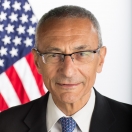
This week, more than 40 heads of state and government from across Africa are joining President Obama in Washington for the first-ever U.S.-Africa Leaders Summit. Since 2000, the continent has seen enormous progress. Rates of extreme poverty and hunger are down. The number of new HIV infections in sub-Saharan Africa dropped by almost 40 percent between 2001 and 2012. Access to education and health care is on the upswing.
As a result, Africa today is a continent of opportunity. Six of the 10 fastest-growing economies are on the African continent, driven by a rising middle class and a generation of optimistic young people. By 2035, the continent will have a working-age population bigger than that of China or India.
This is the time for the United States and African leaders to look beyond the crises of the moment to the opportunities the next 10 to 15 years have in store — which is why the theme of this week’s Leaders Summit is “Investing in the Next Generation.”
A key part of that agenda hinges on helping African nations develop sustainable economies whose future growth is not constrained by the threat of climate change and environmental degradation. That’s why the Leaders Summit highlights the ways that the United States and Africa are partnering to address both the drivers and impacts of climate change.
Last year, President Obama launched Power Africa, an innovative public-private initiative to expand access to renewable and low-carbon electricity in sub-Saharan Africa, where more than 600 million people currently lack access to modern energy sources. Power Africa is helping drive a clean energy revolution that takes advantage of Africa’s abundant wind, solar, geothermal, and hydropower resources. To harness this potential, the United States is working with African entrepreneurs to catalyze private investment. The U.S.-Africa Clean Energy Finance initiative (ACEF), launched in 2012, has supported more than 25 clean energy projects across Africa and is on track to leverage up to $1 billion in public and private financing for projects that would not otherwise have reached financial close.
Today, the President announced a renewed commitment to Power Africa, pledging $300 million in assistance per year to reach a new, aggregate goal of 30,000 MW of electricity. And the private sector is stepping up, too. The President today also announced private sector commitments of more than $20 billion, including new investments in the Beyond the Grid program, which brings off-grid and small-scale energy solutions to rural communities.
The United States and African leaders also share a mutual commitment to strengthening the continent’s resilience to the impacts of climate change, which is particularly important for agricultural societies to maintain food security. African Union leaders agreed in the Malabo Declaration to accelerate agricultural growth to end poverty, improve conservation of fisheries and aquaculture, reduce vulnerability to climate and weather risk, and mainstream resilience.
The United States has already pledged to join the Global Alliance for Climate Smart Agriculture, launching this fall, and supports investments in climate resilience and environmental sustainability, from combating deforestation to providing climate information services, in countries across Africa. Earlier this year, President Obama issued a Presidential Memorandum taking steps to combat illegal, unregulated, and unreported fishing and the Senate ratified the Port State Measures Agreement, both of which will ultimately help West African countries that are among those hardest-hit economically and environmentally by pirate fishing activities. And by partnering with private and philanthropic partners, we’re going to do more.
That’s why yesterday USAID and the Rockefeller Foundation announced a $100 million Global Resilience Partnership to invest in climate preparedness, adaptation, and inclusive economic growth. In Africa, the Global Resilience Partnership will build on existing efforts in the Sahel and the Horn of Africa to improve drought cycle management and expand climate-resilient agricultural practices, helping communities build economic and environmental resilience and break the cycle of recurrent crises.
And at today’s U.S.-Africa Business Forum, private-sector companies announced an additional $7 billion in commitments to promote agricultural development in Africa as part of the New Alliance for Food Security and Nutrition. This two-year-old effort brings socially responsible private investment to the African agricultural sector, creates good jobs, and encourages countries to enact sustainable agriculture reforms.
Climate change poses serious challenges for Africa, as it does for regions around the world, from extreme weather to sea level rise to drought. But building resilience to climate impacts and expanding clean energy resources will create opportunities for entrepreneurs, innovators, and young people across Africa — and help the continent continue its progress toward building sustainable, dynamic economies for decades to come.
Learn more:


